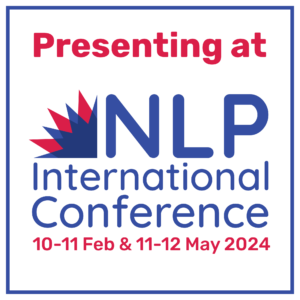NLP: Learn The Essentials in 5 Minutes

NLP was born in the University of California, Santa Cruz (UCSC) in the early 1970s. It was started informally by a group of students and teachers as a way to study excellence and interests that fell outside of any of the academic faculties. This created a culture of creativity and rebellion, which is why NLP has often been frowned upon by the academic establishment. The group created a system which was a forerunner to modern CBT (Cognitive Behavioural Therapy).
As time passed, the original people in this group separated and created their own schools across the USA, and a next generation of trainers was established who eventually founded NLP institutes across the world. NLP School is a UK example. I studied (and now teach) with Robert Dilts and Judith Delozier at NLP University – one of these early groups of American schools.
NLP Goes Global – What Are the Effects?
This globalisation of NLP has created a rich and creative ‘soil’ that has given rise to a huge ‘crop’ of various psychological principles and processes. These processes are a key feature in many ‘soft skills’ trainings and books. Examples are the Disney Creativity Process which is used by coaches and businesses to launch new products or to build effective teams. Another example is Learning Styles: Visual, Auditory and Kinaesthetic – something that came from NLP that is now an established part of education.
Santa Cruz is also very close to the epicentre of Silicon Valley: Palo-Alto and San Jose. NLP has often borrowed scientific methods and terminology as it ‘grew up’ alongside businesses such as Apple and Google. Here is an example of using this type of techie language to explain what NLP means:
Neuro – The human brain is a bit like a bunch of computer chips. Very powerful, but not that much different to a monkey unless it is given the opportunity to learn language.
Linguistic – Language literally wires the human brain, a bit like a computer – connecting these various computer chips by a method called programming.
Programming – The language wiring is created by experiences that are generalised into unconscious rules that allow the human to excel. Before this, the only way to learn complex behaviours was through genetics – humans learn to cross roads in this way and animals don’t. However, this exact same process can also lead to bizarre and unhelpful programmes.
State vs NLP State
Another key point to make sense of these ideas, is to understand the significance of the word ‘state’ in NLP. In common English, the word ‘state’ usually means being in an upset or negative mood. However, in NLP ‘state’ means any combination of thoughts and feelings that we can categorise as being resourceful, or unhelpful, in a given situation. For instance, learning is state dependent; if someone is tired or agitated, they will not learn as effectively.
Going back to the programming principle, in NLP we believe that ‘state’ has a significant role to play. During difficult moments in childhood, we are likely to have adopted a range of negative programmes. Some common examples are when a child is told they are not good enough to sing, do sport, be attractive, be clever (etc.) by an authority figure. Those original words (linguistic) are then converted into a state because it is a more efficient and quicker way to process information than by hearing inner words.
How Do States Work in NLP?
This principle is worth unpacking in more detail. When a child learns to cross a road, they notice a parent holding tightly on to their hand; they sense the fear the parent has when they are told to “Always look both ways before crossing.” This process is repeated until the parent witnesses that the child enters a similar ‘state’ before crossing – automatically looking both ways, in a focused and slightly fearful manner. The parent is then satisfied the child will be safe and the child is given their first ‘taste’ of freedom. However, at the heart of this story is also the problem of programming: the words disappear and are replaced by a state that drives our behaviour.
The same process takes place when we form erroneous beliefs based on accepting the words of an early authority figure mentioned above. For example, if we receive a negative message such as ‘Don’t show off’ a belief such as ‘Outgoing people are shameful and unlovable’ can be created. We then enter a similar process to ‘crossing the road’ which eventually leads to us to feeling bad every time an opportunity to make a connection to other people is presented. Sadly, we might then avoid these situations and lose out in numerous aspects in life. However, we do not know we are doing this – we think it is completely normal because we have taken this state (or reaction) for granted.
Why Learn NLP?
One of the main jobs of NLP has been to create a wide variety of techniques to help people discover these unhelpful programmes and reverse them. This can often transform a person’s life as they not only realise that their childhood programming is wrong, they also feel better because their state has changed. This can open opportunities for health, relationships and career that were stuck because of what is effectively a mistake in programming that created devastating consequence upon someone’s life. So often, these early ‘mistakes’ may have been fairly innocent at the time and NLP’s enduring popularity is because it works – people’s lives change for the better.
Did you like this post?
Then check out our events and courses!
Where to find us
For posts, events, free open days and more, follow NLP School on:
What to read next
What Are Values in NLP And Why Are They Important?
Clarifying and Updating Your Vision









